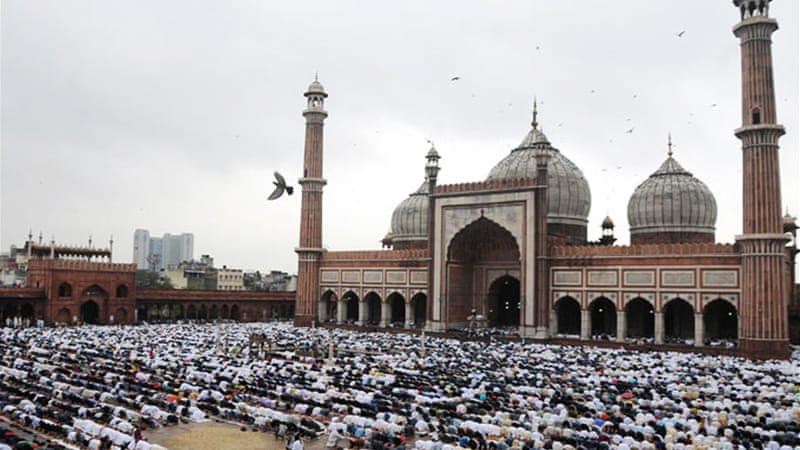Where do Muslims stand in India!

KASHMIR - The Constitution of India enshrines in article 51A (e) that every citizen is bound by the fundamental duty to promote harmony and the spirit of common brotherhood amongst all the people of India transcending religious diversities. Articles 15 reads as “The State shall not discriminate against any citizen on grounds of religion.” Accordingly in Article 16 which reads “No citizen shall, on grounds of religion, be discriminated against in respect of, any employment or office under the State.” But in reality, there is a different story for Muslim community. Muslims are dominant minority (18 crores). Incidentally, there are 56 Muslim countries in the world, Plus, 20 countries where Muslims are dominant minority.
National Muslim population as per census 2011 is 14.2 % (18 crores) hence there should have been 77 Muslim members in the Lok Sabha (Parliament) out of 543. But the average number of Muslims in Lok Saba since 1952 to 2014 has not exceeded above 25 in number. In present Union Council of 78 Ministers, there is only one Muslim minister in Proportion of 12.
A large cross-section of the people in India have the conviction that political participation and representation in governance structures is essential to achieve equity. The participation is denied to Muslims through a variety of mechanisms. For instance, many names of Muslims were missing in the voter lists in a number of states.
Muslim concentration constituencies of Assemblies and Parliament declared as reserved for Schedule Caste whereas constituencies with very low Muslim population but high Schedule Cast concentration remain unreserved. The Muslims are being systematically denied political participation. The Justice Sachar Committee (a high-level committee nominated by Prime Minister of India Dr. Manmohan Singh headed by Justice Rajinder Sachar) has collected data from all over the country in this regard.
In the field of literacy the rate among Muslims is far below than the national average. The gap between Muslims and the general average is greater in urban areas and women. 25 percent of Muslim children in the 6-14 year age group have either never attended school or have dropped out. Dropout rates among Muslims are higher at the level of primary, middle and higher secondary.
In premier colleges, only one out of 25 undergraduate students and one out of 50 post-graduate students is a Muslim. Unemployment rate among Muslim graduates is the highest among all socio-religious communities. Only 3% of Muslim children among the school going age go to Madarsas. Muslim parents are not averse to mainstream education or to send their children to affordable Government schools.
But access to government schools for Muslim children is limited. There is non-availability of schools within easy reach for girls at lower levels. The absence of girl’s hostels and female teachers are also impeding factors.
The average amount of bank loan disbursed to the Muslims is 2/3 in comparison disbursed to other minorities. In some cases, it is half. The Reserve Bank of India’s efforts to extend banking and credit facilities under the Prime Minister’s 15-point programme of 1983 has mainly benefited other minorities marginalizing Muslims.
The presence of Muslims has been found to be only 3% in the IAS (Indian Administrative Services) 1.8% in the IFS (Indian foreign Services) and 4% in the IPS (Indian Police Services). The share of Muslims in employment in various departments is abysmally low at all levels.
Muslim community has a representation of only 4.5% in Indian Railways while 98.7% of them are positioned at lower levels. Representation of Muslims is very low in the Universities, Banks Corporates etc. In no state does the representation of Muslims in the government departments match their population share.
Muslim-OBCs (other backward categories) are significantly deprived in comparison to Hindu-OBCs. The work participation rate shows the presence of a sharp difference between Hindu-OBCs (67%) and the Muslims. The share of Muslim-OBCs in government/ Public sector jobs is much lower than Hindu-OBCs. Out of every hundred workers about eleven are Hindu-OBCs, only three are Muslim-Gen and one is a Muslim-OBC.
There are about 5 lakh registered Wakfs (mortmain property) with 6 lakh acre land and Rs 6,000 crore book value. But the gross income from all these properties is only 163 crores i.e. 2.7%. The management of Wakf Boards is unsatisfactorily due to inadequate empowerment of the State Wakf Boards and Centreal Wakf Council. Encroachment of Wakf properties by the State is a common practice.
The attitude of the State Governments and their agencies has resulted in large scale abrogation of the cherished objectives of the Wakfs. The prime minister is aware that large number of half a million Waqf properties in India are under unauthorized occupation.
There is a widespread encroachment of Muslim graveyard land (Qabristan) and it is the Government’s statutory duty to protect these properties but there exists no such issue pertaining to Hindu cremation grounds (Shamshan). There are so many other issues like Delimitation, extremism etc. where Muslims have suffered politically, physically and economically.
The government has acknowledged disadvantages faced by Muslims and has put its recommendations through “The Justice Sachar Commission report” which was conducted by a high-level committee nominated by Prime Minister Manmohan Singh in 2006. It has provided exhaustive research on Muslim socioeconomic conditions, and made a wide range of proposals. Need of the hour is to start work in letter and spirit on implementation of recommendations by Sachar Commission.
Reference: Sachar Commission report (The commission was setup to assess the socio-economic conditions of muslims constituted by then Prime Minister of India Dr. Manmohan Singh and was headed by Justice Rajinder Sachar. The report was submitted to the Government in 2006.
Consultations: Dr. Syed Zaffar Mahmod, President Zakat Foundation of India and former officer on special duty to Prime Minister of India.

Leave a Comment